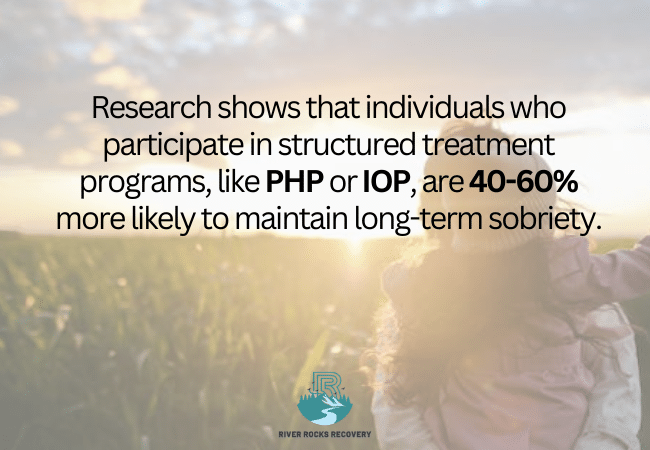Choosing to pursue recovery is a courageous decision, and choosing the correct addiction recovery program is an important step in the process. With so many programs available, it’s critical to understand your options and find the best fit for your needs, lifestyle, and goals.
This blog will walk you through the various types of recovery programs and provide advice to help you choose the one that is best for you or a loved one. So, let’s get going!
What Are Addiction Recovery Programs?
Addiction recovery programs combine medical care, therapeutic support, and holistic approaches to help individuals overcome substance use disorders. These programs aim to address the underlying causes of addiction while equipping individuals with tools to maintain long-term sobriety.
At River Rocks Recovery, our comprehensive services include:
- Addiction Treatment Programs
- Drug Rehab Programs
- Addiction Therapy Programs
- Levels of care such as Partial Hospitalization Programs (PHP), Intensive Outpatient Programs (IOP), and Outpatient Treatment Programs
By offering a continuum of care, we ensure that each individual’s recovery journey is supported at every stage.
Types of Addiction Recovery Programs
Understanding the differences between recovery programs can help you determine the best fit for your unique needs.
1. Inpatient treatment Programs
Inpatient or residential rehabilitation programs are designed for people who require intense treatment in a controlled, distraction-free setting. Patients stay on-site at the institution for the duration of their treatment, which usually lasts between 30 and 90 days. It is ideal for:
- People with severe addiction or co-occurring mental health issues.
- Those who require 24-hour medical or emotional support.
- People seeking a new beginning free from triggers and stressors.
2. 12-Step Programs
12-step programs, such as Alcoholics Anonymous (AA) and Narcotics Anonymous (NA), use a peer-support approach. These programs emphasize spiritual development, accountability, and building a supportive community of people in recovery. It is ideal for:
- Those who value shared experiences and peer support.
- Individuals seeking long-term, community-based recovery resources.
3. Partial Hospitalization Programs (PHP)
PHPs provide a structured and intensive level of care, often serving as a step down from inpatient treatment. Patients receive comprehensive therapy and medical support during the day and return home in the evenings.
Key Features:
- Individual and group therapy sessions
- Medication management for withdrawal symptoms or co-occurring conditions
- A focus on relapse prevention and building coping skills
- Access to medical professionals and therapeutic specialists
Ideal For:
- Individuals transitioning from inpatient treatment
- Those requiring a high level of care while maintaining some independence
4. Intensive Outpatient Programs (IOP)
IOPs are designed for individuals who need structured support but also want to maintain their daily responsibilities, such as work or school.
Key Features:
- Therapy sessions several times a week, often in the evening
- Flexible scheduling to accommodate personal commitments
- A focus on managing triggers and building resilience
Ideal For:
- People who have completed PHP or inpatient care
- Those with strong support systems at home
5. Outpatient Treatment Programs
Outpatient programs offer the most flexibility and are often used for ongoing support during recovery.
Key Features:
- Weekly or bi-weekly therapy sessions
- Continued access to professional guidance and resources
- Support for long-term recovery goals
Ideal For:
- Individuals in the later stages of recovery
- Those with mild substance use disorders or stable home environments
6. Specialty and Luxury Programs
Some recovery programs target specific groups, such as professionals, LGBTQ+ people, or veterans. Others provide upscale amenities and individualized care, generally in tranquil, resort-style locations. It is ideal for:
- Those seeking a personalized approach based on their history or preferences.
- Individuals who value privacy and high-end accommodations.
Choosing the Right Program: Basic Tips to Follow!
Choosing the best rehabilitation program requires assessing your requirements and priorities. Here are some ways to help you decide:
How to Choose the Right Program
When selecting a recovery program, it’s essential to consider your specific needs, lifestyle, and recovery goals. Key factors include:
1. Severity of Addiction
- Severe addictions may require PHP or inpatient care for intensive support.
- Mild to moderate cases can often be managed through IOP or outpatient care.
2. Co-Occurring Disorders
- If you’re experiencing mental health challenges alongside addiction, choose a program that integrates Mental Health Therapy with substance use treatment.
3. Support System
- Those with a supportive home environment may thrive in outpatient settings, while those without may benefit from the structured care of a PHP.
4. Treatment Philosophy
- Look for programs that align with your preferences, whether it’s traditional therapy, holistic approaches, or a combination of both.

Join River Rocks Recovery for the Best Addiction Recovery Programs
At River Rocks Recovery, we provide holistic addiction rehabilitation programs tailored to your specific needs. Whether you need inpatient care, outpatient flexibility, or holistic techniques, our skilled staff will guide you every step of the way. We’re here to help you recover your life by using evidence-based therapies, creating a caring environment, and focusing on long-term success.
Why Choose River Rocks Recovery?
At River Rocks Recovery, we believe in empowering individuals to achieve long-term recovery. Our programs are designed to meet you where you are, offering personalized care and unwavering support.
- Addiction Treatment Programs tailored to individual needs
- A continuum of care, including PHP, IOP, and Outpatient Programs
- Integration of Mental Health Treatment for holistic healing
If you or a loved one is ready to take the first step, contact us today. Recovery is possible, and we’re here to guide you every step of the way. Take the first step and contact us today at (888) 905-6281.
FAQ on Addiction Recovery Programs
What are the main types of addiction recovery programs?
The main types of recovery programs include Partial Hospitalization Programs (PHP), Intensive Outpatient Programs (IOP), and outpatient treatment. Each offers varying levels of care, depending on the severity of addiction and individual needs.
How do I know which addiction recovery program is right for me?
Choosing the right program depends on factors like the severity of your addiction, co-occurring mental health conditions, and your support system. Consulting with a treatment center can help you make an informed decision.
What is the difference between PHP and IOP?
PHP offers a more intensive level of care, typically with full-day therapy sessions, while IOP provides therapy several times a week, allowing patients to maintain work or school commitments.
Can outpatient treatment work for severe addiction?
Outpatient treatment is generally better suited for mild to moderate cases of addiction or for individuals who have completed higher levels of care, like PHP or IOP.
Why is therapy important in addiction recovery programs?
Therapy helps address the underlying causes of addiction, build coping mechanisms, and prevent relapse. Programs often include individual, group, and family therapy sessions.
Do addiction recovery programs treat co-occurring mental health conditions?
Yes, many programs, including those at River Rocks Recovery, provide dual diagnosis treatment to address both addiction and mental health challenges simultaneously.




























